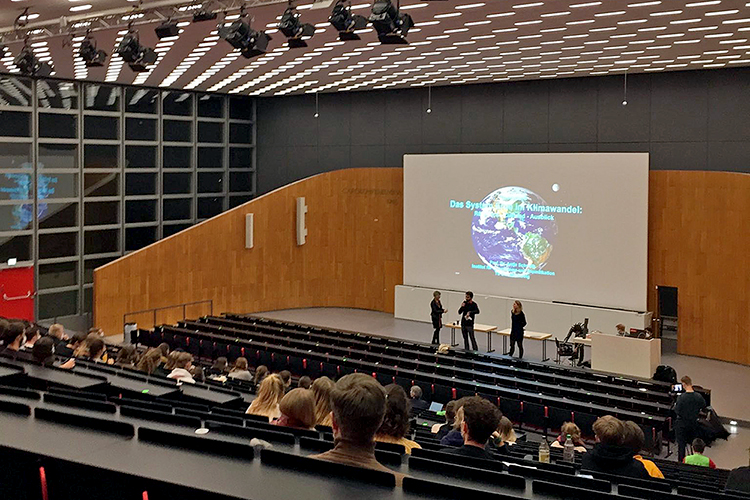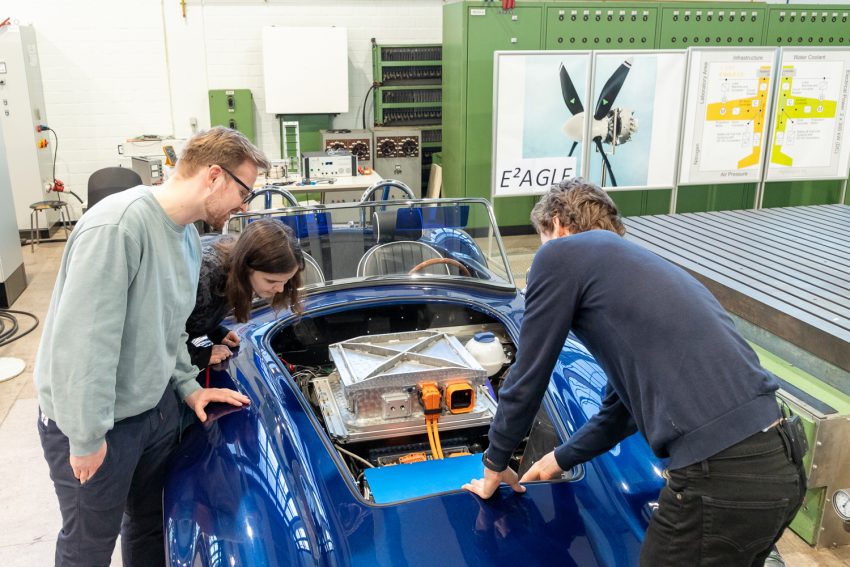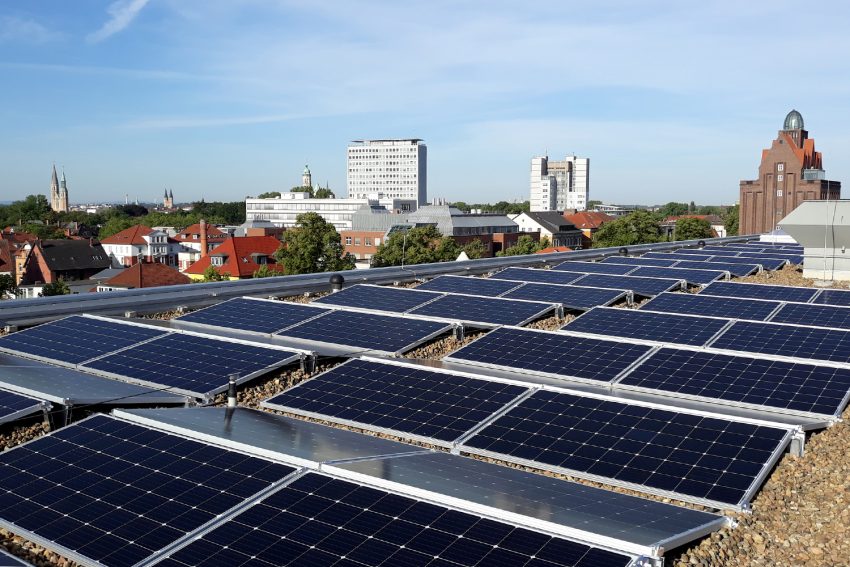A future without fossil fuels TU Braunschweig on the road to greater sustainability
There will need to be no less than a complete volte-face in terms of policy, particularly in the sectors energy and transport, if the German aim of becoming climate neutral by 2045 is to be really achieved. In the near future, we will need to think about what sustainable alternatives we can use as replacements wherever natural gas, oil or coal is currently being employed as a source of energy. And at a time when energy costs are going through the roof, this topic becomes even more relevant. TU Braunschweig must make its contribution to putting the climate goal within reach. One thing we can do is train specialists with the necessary skills to put in place the requirements for attaining climate neutrality. At the same time, we ourselves need to become more sustainable and environmentally aware in terms of our teaching, research and administrative activities. The question is just how far the university has as yet managed to get down the road to accomplishing this. We looked around on campus to see what could help and for this purpose got in touch with the Sustainability Working Group of the elenia Institute for High Voltage Technology and Power Systems and also our Division of Facility Management.
“Here at TU Braunschweig there is already a whole lot going on when it comes to sustainability,” says Professor Wolfgang Durner, who heads the Sustainability Working Group, in view of the many and various courses, projects and initiatives taking place. In fact, it is sometimes difficult to retain an overview of everything that is happening. In this context, the Sustainability Working Group forms the central link between the President’s Office, administration, teaching staff and students. Its objective is not only to make university activities more sustainable and ensure the subject has a high profile here, but also to design related permanent structures for use by the respective decision-making entities. “Unless we give this matter some form of stable basis within the responsible committees, there is always the risk that it will simply be overlooked,” explains Durner.
Hence, there are representatives of all the departments, status groups and management bodies in the working group. The working group is additionally assisted by the Green Office, which, as a sustainability office, wants to make the topic more present in campus life and teaching. The effect of the work being undertaken by the Sustainability Working Group and the Green Office becomes particularly apparent in the way it has influenced the aims and values of the university. Within these are now anchored sustainability strategies and the 17 Sustainable Development Goals of the UN. The university has defined its mission in the following words: “TU Braunschweig aims to manage its decisions and processes in all areas of operation, research and teaching in such a way that ecological, social and economic sustainability have the highest priority. In this context, climate protection and the careful use of energy and natural resources are of particular importance.” In addition, the Green Office, with the help of the Sustainability Working Group and the cooperation of the General Students’ Committee and Students for Future, has launched a publicity-generating platform enabling wider debate on the issue of sustainability in the form of the lecture series ‘TU for Future’. Researchers from throughout Germany are invited to give talks on their work in this field in one of the two largest lecture halls on campus and each lecture is followed by a discussion with the students and public present in the audience.

In the lecture series ‘TU for Future’, researchers speak about their work in the fields of sustainability, climate and environmental protection. Photo credits: Green Office/TU Braunschweig
Specialists in climate neutrality
There are not only the ‘TU for Future’ lectures, but teaching here is also moving in the direction of paying greater attention to sustainability-related themes. More than 30 courses across all departments now deal in some way with aspects of environmental protection, forms of resource-friendly activity and similar. Indeed, certain study programmes, such as Environmental Sciences, Environmental Engineering, Sustainable Energy Technology and Sustainable Engineering of Products and Processes are fully concerned with sustainability-related issues. Moreover, the number of study programmes that tackle sustainability as a subject is on the increase. Among these is the new Bachelor degree course ‘Sustainable Energy Systems and Electromobility’ (NEEMO for short), which will be starting this winter semester 2022/23.
“We decided to initiate the NEEMO study programme as we had become aware that students are placing ever greater emphasis on acquiring skills in sustainability and environmental protection as part of their education,” points out Professor Bernd Engel, director of the elenia Institute for High Voltage Technology and Power Systems. The course itself is such that it is perfectly consistent with what is necessary to help achieve the policy goal of climate neutrality by 2045. “If we are to genuinely get there, we need specialists with the necessary training who can not only create the required technical fundamentals but also have the ability to communicate their research and results with the general public.” Course participants will have to have sufficient knowledge of the basics, for example, of electrochemistry and thermodynamics, and also sound expertise in electrical engineering in order to adequately cope with the challenges they will be facing when they need to find solutions during the study programme to how to accomplish a turnaround in the energy, climate and transport sectors. Among the problems facing them will be: How to provide an energy supply that does not rely on fossil fuels. Whether it is the development of battery or fuel-cell powered vehicles that should be given priority. How to put in place the infrastructure required to power e-mobility forward. What we should use in place of oil and gas for heating. How to meet the increased demand for electricity following wider future electrification in the domestic and industrial spheres.
Infrastructure for the ‘Energiewende’
These are concerns that are also central to the research being carried out at the elenia Institute for High Voltage Technology and Power Systems. “There is absolutely no future for fossil fuels,” states Professor Engel with conviction. Among the questions being investigated at the institute is how to ensure stable operation of power grids when conventional power plants that use fossil fuels, such as coal and gas, are completely shut down – at least temporarily – during times of peak demand and the electricity supply is provided exclusively by means of solar and wind power. Voltage and frequency – in Europe this is 50 Hz – will need to be maintained when the grid is supplied using renewable energies with the help of ancillary services, and these will involve the monitoring, balancing and repair of the energy infrastructure. Being assessed in other research projects are the multi-use of energy storage installations in residential buildings and the integration of hydrogen-based energy technologies, such as electrolysis and fuel cell systems, in the power grid. Many of the concepts being studied at elenia can be implemented within the next two to five years, estimates Professor Engel.
Extensive research is also being undertaken into the decentralised supply of power using renewable energies. Wind and sun can be locally sourced to generate electricity through wind turbines and photovoltaic panels. Hence, power could be produced and stored directly in the residential areas of the cities of the future. Both elenia and the Institute for Building Climatology and Energy of Architecture (IBEA) are currently involved in the core research area ‘Future City’ and are considering, among other things, ways of storing self-produced energy in clay brick walls. What Professor Engel would like to see is greater awareness of the needs of climate and environmental protection among residents in response to the opportunities for energy generation and storage in their locality, so that these would become increasingly active in making their neighbourhoods more sustainable and climate-neutral. Sustainability in this context would also have a social facet. Professor Engel predicts that local people would be able to participate in their energy collectives and not only store the electricity they have themselves generated but also market it amongst themselves in line with the stipulations of the relevant EU directive.

Students in the new NEEMO degree programme are researching new e-mobility solutions, among other things. Picture credits: Kristina Rottig/TU Braunschweig
Building technology and energy-saving potential
Photovoltaic systems have long been employed as an acceptable means of producing electricity. Henning Hartmann, head of the Energy Management team at TU Braunschweig, points out that a total of 12 photovoltaic systems that have a peak output of some 841 kW are currently installed on the roofs of the university buildings. Another three, providing an additional output of some 183 kW, are to be installed at the north campus this year. Thanks to its solar panels, TU Braunschweig will in future itself be able to generate approx. 860,000 kWh electricity annually. This is equivalent to 2.7% of the total electricity requirement of the university. In comparison, a private photovoltaic system on the roof of a single family house is capable of generating roughly 5,000 kWh.
Two-thirds of the energy costs incurred by the university are for electricity, meaning that our solar panels provide a double benefit. They not only produce electricity from a renewable resource but also help reduce our expenditure on energy.
“There is little doubt that the technical side of building construction offers the greatest potential for saving energy in the context of architectural design,” adds Henning Hartmann. Consequently, at the university we are constantly on the outlook for possible sustainable solutions. For example, the installation of recirculation pumps to supply heating and air-conditioning systems would require a smaller investment but would have an immediate effect and pay off after just one to two years. More expensive but associated with a greater savings potential would be the upgrading of complete air-conditioning systems, such as those in our Biocenter. With regard to ventilation and air extraction, among the most energy-intensive processes, the associated savings would generally be in the range of several hundred thousand to millions of Euros over the operating life of the systems.
Cutting costs by energy budgeting
In connection with facility management, TU Braunschweig also looks to reduce energy consumption and places the responsibility for this on the shoulders of the users. Since 2014, each university building has been assigned a budget for energy costs. Over a period of two years, the energy use by each building was measured and the mean consumption determined on the basis of the results. The outgoings for energy in 2012 formed the basis for the budgets. The budgets, stipulating the upper limits for energy costs, were then calculated for each of the buildings and each institute accommodated within them. If these upper limits are exceeded, the institute in question is required to make up the difference from its own institute budget. If, on the other hand, an institute does not exhaust its assigned energy budget, it shares in the savings, receiving the corresponding sum as a bonus. The yield from structural measures, such as the solar panels, also contributes to helping balance the budget for energy costs of the university as a whole.

Twelve photovoltaic systems have already been installed on the roofs of the university. Photo credits: Lars Altendorf/TU Braunschweig
Saving energy together
The effect that the personnel of TU Braunschweig can have on the reduction of energy consumption should not be underestimated. Working in collaboration with Facility Management, it would be possible for example to define rules that would mean that less energy is used as a result of changes to routine activities. “In the chemical building on Hagenring, energy costs were reduced by 25 per cent by adapting the ventilation concept and associated work processes,” says Hartmann. Instead of running at full power around the clock, the ventilation systems are throttled back overnight. No work with hazardous substances is then permitted during this period, but the building’s energy costs could be reduced by over 200,000 € per year.
Professor Martin Korte, a member of the Energy Advisory Board and director of the Zoological Institute, is convinced that a reduction in our consumption of energy has now become a matter of urgency. He appeals to everyone, not just those at TU Braunschweig, to be environmentally aware and adopt an energy-saving attitude. It would be otherwise impossible to limit global warming to the 1.5°C of the Paris Agreement and the university itself would lose its ability to control its finances thanks to escalating energy costs. Professor Korte asks all of us to consider our own behaviour and think of ways of suitably minimising our use of energy; his advice in this connection that can be followed by everyone at short notice is to switch off computers and lighting when these are not actually in use or required. “It would also help to make colleagues aware of the impact that their routine activities might be having – in polite terms, of course. It is often difficult to know that your routine may be having negative effects because you are all too frequently oblivious of what you are actually doing during work of a repetitive nature. In such situations, others can draw our attention to our failings.”
Furthermore, all employees are invited by the Vice President for Human Resources, Finance and Infrastructure, Dietmar Smyrek, to send their ideas and suggestions for ways to save energy by email to energiesparen@tu-braunschweig.de. Any submissions will be suitably processed for publication and posted on a dedicated website. One thing is clear – irrespective of the many different forms that our quest for sustainability takes at TU Braunschweig we will only reach our goal of climate neutrality by working together.
